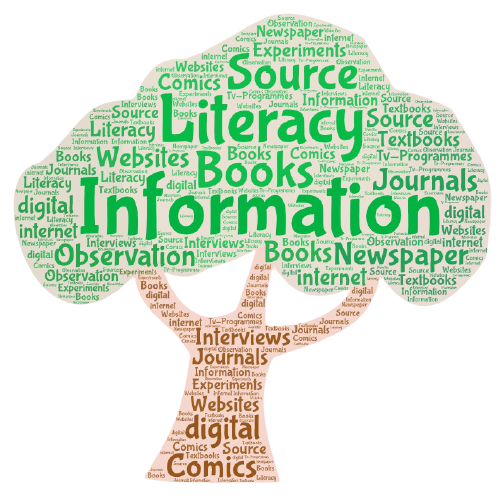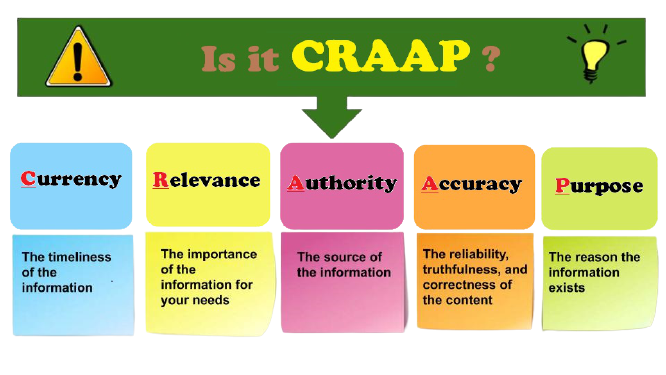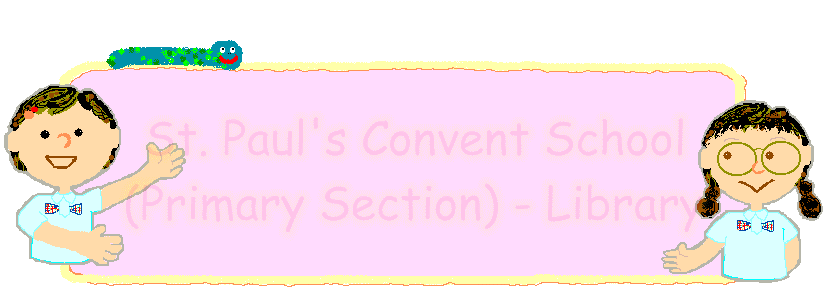
Information Literacy
"Information literacy is the adoption of appropriate information behaviour to identify, through whatever channel or medium, information well fitted to information needs, leading to wise and ethical use of information in society."
(Webber & Johnston, 2003)
"To be information literate, a person must be able to recognize when information is needed and have the ability to locate, evaluate and use effectively the needed information." (American Library Association, 1989)
A Method Used to Evaluate Information Source

The CRAAP Test is used to help you evaluate resources. It is most often used to evaluate websites, but the same criteria can be applied to other types of resources as well. CRAAP is an acronym that stands for: Currency, Relevance, Authority, Accuracy and Purpose. For each criteria, there are several questions to be asked:

For example:
- Is the information published in the last five years?(yes)
- Is the information for public or for professionals?(for professionals)
- Who is the author? (Dr CHAN Hon-yee, Director of Health)
- Is the information supported by evidence?(yes)
- What is the purpose of the information? (to teach…)
- After evaluating the source, I will use it for my project!
- (Published in the last 5 years is ok?)
- When was the information published or last updated?
- Has the information been revised or updated?
- Is the information current or out-of date for your topic?
- Are the links functional?
- Does the information relate to your topic or answer your question?
- Who is the intended audience?
- Is the information at an appropriate level? (For public or for professionals ?)
- Have you looked at a variety of sources before determining that this is one you will use?
- Would you be comfortable using this source for a research paper?
- Who is the author/publisher/source/sponsor?
- Is the author's credentials or organizational affiliations given?
- What are the author's qualifications to write on the topic?
- Is there contact information, such as a publisher or e-mail address?
- Does the URL reveal anything about the author or source? Examples:
- .com (commercial),
- .edu (educational),
- .gov (U.S. government),
- .org (nonprofit organization),
- .net (network)
- Where does the information come from?
- Is the information supported by evidence?
- Has the information been reviewed or referenced?
- Can you verify any of the information in another source or from personal knowledge?
- Does the language or tone seem biased and free of emotion?
- Are there spelling, grammar, or other typographical errors?
- What is the purpose of the information? to inform? to teach? to sell? to entertain? to persuade?
- Do the authors/sponsors make their intentions or purpose clear?
- Is the information fact? opinion? or propaganda?
- Does the point of view appear objective and impartial?
- Are there political, ideological, cultural, religious, institutional, or personal biases?
Currency: the timeliness of the information
Relevance: the importance of the information for your needs
Authority: the source of the information
Accuracy:the reliability, truthfulness, and correctness of the content
Purpose: the reason the information exists
Reference:
Washington State University.(2020). Information Literacy Research Skill Building: Evaluating Sources: The CRAAP Test. https://libguides.libraries.wsu.edu/c.php?g=294153&p=1960872
